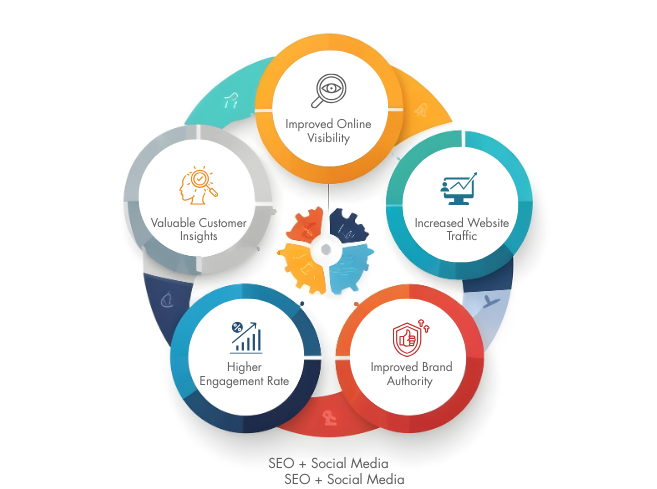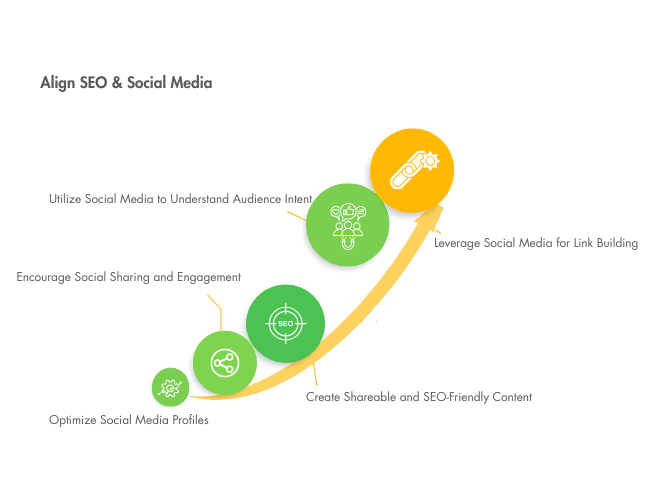Businesses are in a race to build and improve their online presence to reach a greater number of audiences. During this, they hold onto search engine optimization (SEO) and social media as they are part and parcel of building a solid online media presence. Each of them stands powerful on its own, but when combined, the energy created can take your brand’s name to big places. This blog will show you the relationship between SEO and social media, their combined benefits, and actionable strategies you can use to get the best from this combination.
How are SEO and Social Media Connected?
Looking from the outside, SEO and social media seem like two separate areas in digital marketing. SEO works on getting high ranks in search engine results by optimizing website content to increase organic traffic. Whereas social media marketing’s goal is to make audiences consistently stick to multiple platforms like Facebook, Twitter, LinkedIn, and Instagram to promote brand awareness and loyalty.
SEO and social media are closely connected. Social media helps spread your content, which brings more visitors to your website and improves your search engine rankings. Once search engines get to know that your content is being widely shared on social media, they start thinking you are credible and relevant, which eventually uplifts your SEO efforts. In other words, a well-optimized website contains valuable content that can be promoted through social media channels, which improve user engagement and reach.
Benefits of Integrating SEO and Social Media Strategies
You will get a number of benefits like the ones mentioned below by blending SEO and social media strategies.

- Improved Online Visibility:
To increase the chances of attracting new people to your website, a unified strategy that makes sure your brand appears in both search engine results and social media feeds can be used.
- Increased Website Traffic:
A good amount of traffic will come from social media channels to your website and SEO makes sure that this traffic is organic and targeted.
- Improved Brand Authority:
Consistent and high-quality content shared on multiple platforms establishes your brand as an authority in your industry.
- Higher Engagement Rate:
Engaging content optimized for both SEO and social media has higher chances of getting more interactions, shares, and discussions, building a loyal community.
- Valuable Customer Insights:
Social media interactions deliver real-time feedback and insights into customer preferences, which inform your SEO and content strategies.
Strategies to Harmonize SEO and Social Media Efforts
Give these strategies below a try to combine your SEO and social media initiatives in the best way possible.
Optimize Social Media Profiles
Make sure that your social media profiles are complete, professional, and aligned with your brand identity. Incorporate relevant keywords into your profiles to improve searchability. Never skip including your business name, location, and primary services in your bio or description. This practice not only helps in search engine indexing but also gives clarity to potential leads about your brand's offerings.
Create Shareable and SEO-Friendly Content
Developing content that solves the pain point of your target audience and encourages sharing is important. Incorporate relevant keywords naturally within your content to improve search engine rankings. Use eye-catching visuals, compelling headlines, and clear calls-to-action to increase engagement. Remember, content that performs well on social media can drive traffic to your website, which can impact your SEO performance positively.
Leverage Social Media for Link Building
Sharing your content on social media platforms increases its visibility, which can lead to other websites linking to your content. These inbound links, or backlinks, are an undeniable aspect of SEO rankings. Engage with influencers and industry leaders on social media to build relationships that may result in valuable backlinks.
Utilize Social Media to Understand Audience Intent
Social media platforms have large sets of data containing audience interests, behaviors, and feedback. Analyze this data to inform your SEO strategy, making sure that the keywords and content you develop meet your audience's needs and search intent. Tools like social listening can help identify trending topics and common queries.
Encourage Social Sharing and Engagement
Incorporate social sharing buttons on your website and blog posts to make sharing of your content easier. The more your content is shared, the greater its reach and potential impact on SEO. As the cherry on top, you can also build a loyal community by promptly engaging with your audience through comments and messages.

Combining SEO and social media marketing isn’t just helpful; it’s essential for modern digital marketing. Using this integrated approach can help businesses build a robust and resonant brand presence.



